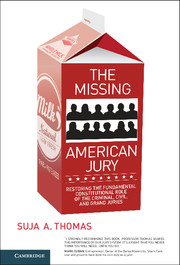 The Missing American Jury
The Missing American Jury Book contents
- Frontmatter
- Contents
- Acknowledgments
- 1 The Missing American Jury: An Introduction
- PART I The Jury Now
- PART II The Future Jury
- 4 Interpreting Jury Authority
- 5 Restoring the Jury
- 6 Beyond the Constitution: Affirming a Role for Lay Jurors in America's Government and World-Wide
- 7 A Branch Among Equals in American Democracy: A Conclusion
- Index
6 - Beyond the Constitution: Affirming a Role for Lay Jurors in America's Government and World-Wide
from PART II - The Future Jury
Published online by Cambridge University Press: 05 June 2016
- Frontmatter
- Contents
- Acknowledgments
- 1 The Missing American Jury: An Introduction
- PART I The Jury Now
- PART II The Future Jury
- 4 Interpreting Jury Authority
- 5 Restoring the Jury
- 6 Beyond the Constitution: Affirming a Role for Lay Jurors in America's Government and World-Wide
- 7 A Branch Among Equals in American Democracy: A Conclusion
- Index
Summary
This book has discussed constitutional necessity thus far. That is, the jury is required under the Constitution, its role has been unconstitutionally usurped, its fall relates to the failure of the traditional actors to view it as an equal – a “branch” – and its revival can occur by restoring it to its former role. Some do not adhere to the past as the constitutional guidepost for the jury and instead view the jury's constitutional role as evolving. For them, for the jury to have a place in the governmental structure, it must have some other value.
Some commentators have rejected any such auxiliary worth for the jury. For example, certain critics consider the criminal jury dispensable for reasons that include the availability of accurate investigative techniques. The grand jury also has been critiqued. The recent failures of grand juries to indict police officers have resulted in calls for their abolition. Even before those events, contrasting politically accountable prosecutors with secretive grand juries, Andrew Leipold argued that prosecutors should be given investigative powers instead of grand juries. He also has asserted that in the absence of grand juries playing any independent function such as working against government corruption, grand juries hold no important role.
Many also argue that the civil jury lacks value. William Nelson and John Langbein both have contended that the civil jury trial has lost its usefulness in light of modern changes. According to Nelson, the reason for juries, which he stated was local self-rule, has disappeared, and the civil jury appropriately declined in authority as its purpose dissipated. Langbein cited other reasons for the obsolescence of the civil jury. He argued that people do not go to trial in civil cases, because they do not need to do so. In his view, discovery, summary judgment, and settlement effectively substitute for the civil jury trial.
This chapter counters these views, showing value for America's jury through two emerging ideas. First, although the jury is often displayed as a prime example of American exceptionalism, the significant and growing use of lay participation in several other countries – often where a constitution does not require it – displays a generally unrecognized role for lay people in governments throughout the world.
- Type
- Chapter
- Information
- The Missing American JuryRestoring the Fundamental Constitutional Role of the Criminal, Civil, and Grand Juries, pp. 187 - 234Publisher: Cambridge University PressPrint publication year: 2016


